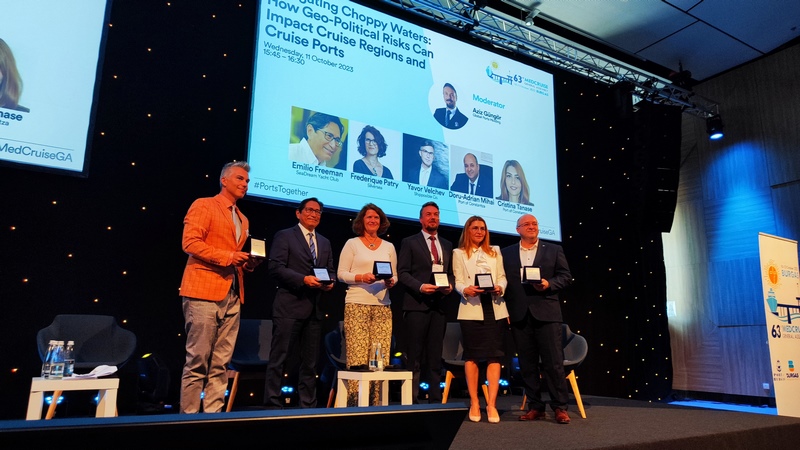Day two of the MedCruise General Assembly in Burgas started with a welcome and introductory speech by the President of MedCruise, Figen Ayan. Her words set the tone for the day with discussions on pressing issues facing the cruise industry.
“This general assembly is reflecting what our industry is strong for. During this period of uncertainty we unite to show a way for peaceful days. We unite to get stronger, and we unite to serve our industry better, and I am proud of MedCruise, as the strongest port association globally, to be flagship for resilience and community.”
The first panel discussion of the day focused on “Strengthening the Cruise Destination Through Port-City Relations and the Engagement of the Local Community.” The discussion revolved around the pivotal role of cruise tourism in port cities and opportunities to bring them close to the local community. Representatives from cruise companies and port members shared their perspectives, highlighting the actions taken and the barriers they continue to address.
Jose Sanchez, Director of Agenda AIVP 2030, Projects and Content highlighted the importance of the port-city relationship and presented the joint working group with MedCruise.
“We launched the working group with several main goals. One was to identify the best practices particularly focusing on all involved in the port-city relationship. We wanted to identify challenges and risks who are a threat, and have a dialogue and concrete outcome on the subject”
Natalie Allaby, Director of Cruise Excellence at Port Saint John, Canada, joined the panel via video link presenting two projects: Area 506 waterfront container village and the port’s pod-learning center and podcast.
“We’ve had that mindset that our customer is certainly the cruise lines and their guests. That’s always going to be the number one priority for us at the port. But it’s really that mindset shift of ensuring that we also think of the citizens as our customers as well, because if they’re not happy, we’re not going to be able to have a social license to operate in the future.”
The second panel discussion addressed the geopolitical risks and the impact of the cruise regions. In an increasingly complex world, geopolitical risks present challenges to the cruise industry.
Frederique Patry, Senior Manager Itinerary Planning at Silversea, shared insights of the geopolitical challenges cruise lines are facing in different parts of the world.
“Traveling around the world, you realize that conflicts exist everywhere, and even when these conflicts are not widely covered by the media, they present challenges for cruise ships. Starting with the South American continent, if you are planning to visit the Falkland Islands, which are a British overseas territory, you need to inform the Argentine Government, and we consider this to be a problem. There are also issues in Africa, such as our inability to travel to Kenya, concerns about China-Taiwan relationships, and challenges with traveling to Cuba. Currently, in the Mediterranean, we are closely monitoring the situation in Israel. The situation is always evolving and we need to be very flexible with planning and therefore the job of itinerary planner is full of surprises.”




